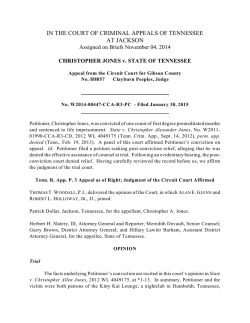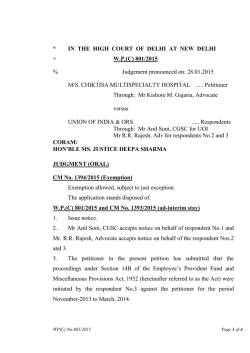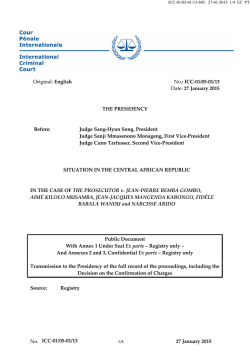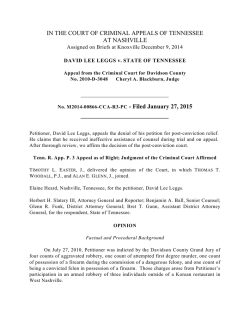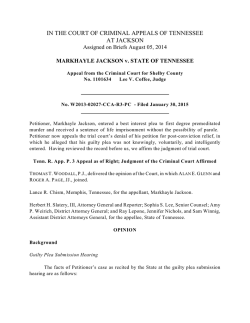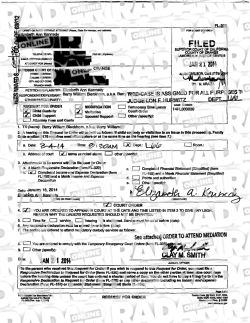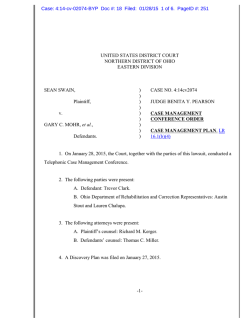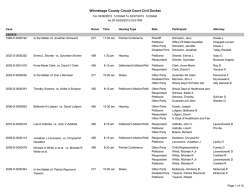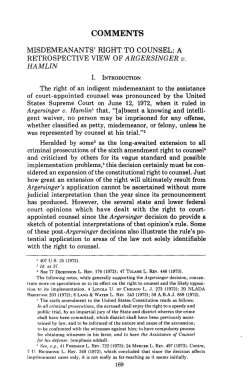
Willie Price v. State of Tennessee
IN THE COURT OF CRIMINAL APPEALS OF TENNESSEE AT JACKSON Assigned on Briefs November 04, 2014 WILLIE PRICE v. STATE OF TENNESSEE Appeal from the Criminal Court for Shelby County No. 0508423, 0508424 Glenn Ivy Wright, Judge No. W2014-00186-CCA-R3-PC - Filed January 30, 2015 Petitioner, Willie Price, appeals from the post-conviction court’s denial of his petition for post-conviction relief. Petitioner was convicted of aggravated rape, two counts of aggravated burglary, and robbery. He received an effective sentence of 60 years in confinement. Petitioner challenged his convictions and sentences on appeal, and a panel of this court affirmed the judgments of the trial court. State v. Willie Price, No. W2009-00083-CCA-R3CD, 2010 WL 376625 (Tenn. Crim. App., Feb. 3, 2010), perm. app. denied (Tenn., June 17, 2010). On appeal, Petitioner contends that his trial counsel was ineffective for failing to properly investigate Petitioner’s case, failing to call witnesses at trial, and by not seeking to suppress DNA evidence. He also asserts that his appellate counsel rendered ineffective assistance of counsel, but Petitioner submitted no argument as to this issue in his brief. After a careful review of the record, we affirm the judgment of the post-conviction court. Tenn. R. App. P. 3 Appeal as of Right; Judgment of the Criminal Court Affirmed T HOMAS T. W OODALL, P.J., delivered the opinion of the Court, in which A LAN E. G LENN and R OBERT L. H OLLOWAY, J R., JJ., joined. Joseph S. Ozment, Memphis, Tennessee, for the appellant, Willie Price. Herbert H. Slatery, III, Attorney General and Reporter; Tracy L. Alcock, Assistant Attorney General; Amy P. Weirich, District Attorney General; and Rachel Russell, Assistant District Attorney General, for the appellee, State of Tennessee. OPINION Trial A summary of the facts underlying Petitioner’s convictions can be found in this court’s opinion in State v. Willie Price, No. W2009-00083-CCA-R3-CD, 2010 WL 376625 (Tenn. Crim. App., Feb. 3, 2010), perm. app. denied (Tenn., June 17, 2010). In that opinion, this court gave the following synopsis of the facts: This case involves a man who became known in the Memphis-area media as the “Hacks Cross Creeper.” On February 11, 2003, a man broke into the Germantown home of the victim, D.W. (footnote omitted), robbed her, extracted her promise that she would not call the police, and then left through the back door. Despite her promise, the victim called the police as soon as her husband returned home. Less than a month later, on March 8, 2003, the same man broke into the victim’s home again, awakened her from her sleep, accused her of lying to him by calling the police, demanded more money, and raped her. The victim fought against the attack and the man bit her arm during the struggle. Approximately two and a half years later, investigators matched the DNA profile of saliva obtained from the victim’s wound to the defendant. Following his arrest, the defendant gave a statement to police in which he admitted that he had twice burglarized the victim’s home and robbed her. He also admitted that he had penetrated the victim’s vagina with his penis, but he claimed that the sexual contact had been consensual. Id., at *1. Post-conviction hearing In his Amended Petition for Post-Conviction Relief, Petitioner asserted 14 examples of trial counsel’s ineffectiveness; however, on appeal, Petitioner makes only the following assertions: trial counsel was ineffective for failing “to call any witnesses, known or that should have been known to counsel, who had relevant information to the defense and their theories at trial[;]” trial counsel was ineffective for “failing to send an investigator to interview the police officers who transported Appellant from Mississippi after a DNA ‘reverse hit[;]’” and “[t]rial counsel failed to file any motion to suppress the DNA identification.” We therefore limit our summary of the evidence presented at the postconviction hearing and our discussion of the issue to those claims. -2- Petitioner testified at the post-conviction hearing that his relationship with trial counsel was “pretty good.” He communicated with trial counsel in jail and in court. Petitioner could not recall whether trial counsel reviewed with him the State’s discovery response or whether there was a suppression hearing. When asked what more trial counsel could have done to defend him, Petitioner responded, “I’m just believing that it was more that he could – probably could’ve done from what my [appellate counsel] was telling me.” Petitioner testified that his DNA was obtained following an arrest in Mississippi in 2003. He testified that the Mississippi charge was subsequently dismissed, but his DNA was in the Tennessee Bureau of Investigation’s database, and a “reverse hit” was used as evidence against him. Petitioner testified that trial counsel told him he was going to hire “a DNA expert.” Petitioner was asked on cross-examination, Q. Okay. You realize that if he had gotten a DNA expert and that DNA expert had agreed with the State’s expert, that now there’s two experts that would’ve been testifying against you at trial, right? A. Possibly, yes. Petitioner responded to questions by the post-conviction court about Petitioner’s specific claims of ineffective assistance of counsel. The court asked Petitioner about his claim that trial counsel “failed to investigate and develop evidence on [his] behalf [and] presented no defense to the State’s case.” Petitioner responded that trial counsel “was supposed to get a detective . . . dealing with DNA evidence, you know, but that didn’t – I don’t think that happened.” When asked if there was any evidence that he would have wanted presented at trial that trial counsel did not present, the petitioner responded that: Well, I would’ve . . . just really wanted him to bring forth . . . anybody that . . . had any say . . . in my case . . . as far as the officers . . . and just really the DNA because . . . I had charges in [an]other state, . . . and – pertaining to [the officers] saying they had DNA, but . . . the DNA didn’t prove to be me, you know. The charge – the case had got dismissed, so that’s how I got tied to this. When asked if there was any other evidence that trial counsel should have presented in his defense, Petitioner responded, “[n]ot at this moment because like I said, I don’t have – I’m not really prepared, you know.” Trial counsel testified that he had practiced law for over 30 years and had been employed with the Shelby County Public Defender’s Office since 1989. He estimated that -3- he had represented clients in approximately 125 to 150 jury trials. Trial counsel testified that Petitioner was originally charged with more than 20 aggravated robberies in Collierville and Germantown, which were collectively known as “the Hacks Cross Creeper Cases.” Two of the cases were consolidated and tried, and the other cases were dismissed. He testified that he “absolutely” provided Petitioner with a copy of discovery. Trial counsel testified that he visited Petitioner in jail “at least ten times.” Trial counsel described his working relationship with Petitioner as “very good.” Trial counsel filed two motions to suppress evidence. He filed a motion to suppress a recorded jailhouse telephone call, during which Petitioner admitted that he had been inside the victim’s home, as well as a motion to suppress Petitioner’s statement to police. Trial counsel testified that in Petitioner’s statement to police, he stated that he had consensual sex with the victim and that the victim “was effectively the first aggressor and [the petitioner] had a penchant for Asian women.” Trial counsel testified that he never discussed hiring a DNA expert with Petitioner. He testified that the TBI report showed that Petitioner’s DNA matched the DNA evidence found at the scene to the “exclusion of the world population.” Trial counsel did not hire an investigator to speak with any witnesses because he did not believe it was necessary in Petitioner’s case. Trial counsel testified that he was as prepared as he could have been for Petitioner’s trial, and he would not have done anything differently in his representation of Petitioner. Analysis The post-conviction petitioner bears the burden of proving his allegations by clear and convincing evidence. See T.C.A. § 40-30-110(f). On appeal, the appellate court accords to the post-conviction court’s findings of fact the weight of a jury verdict, and these findings are conclusive on appeal unless the evidence preponderates against them. Henley v. State, 960 S.W.2d 572, 578-79 (Tenn. 1997); Bates v. State, 973 S.W.2d 615, 631 (Tenn. Crim. App. 1997). By contrast, the post-conviction court’s conclusions of law receive no deference or presumption of correctness on appeal. Fields v. State, 40 S.W.3d 450, 453 (Tenn. 2001). As a mixed question of law and fact, this court’s review of a petitioner’s ineffective assistance of counsel claim is de novo with no presumption of correctness. Felts v. State, 354 S.W.3d 266, 276 (Tenn. 2011). To establish entitlement to post-conviction relief via a claim of ineffective assistance of counsel, the post-conviction petitioner must affirmatively establish first that “the advice given, or the services rendered by the attorney, are [not] within the range of competence demanded of attorneys in criminal cases[,]” see Baxter v. Rose, 523 S.W.2d 930, 936 (Tenn. 1975), and second that his counsel’s deficient performance “actually had an adverse effect on the defense[,]” Strickland v. Washington, 466 U.S. 668, 693, 104 S. Ct. 2052, 80 L. Ed. 2d 674 (1984). In other words, the petitioner must “show that there is a reasonable probability that, but for counsel’s unprofessional errors, the result of the proceeding would -4- have been different.” Id. at 694. Should the petitioner fail to establish either deficient performance or prejudice, he is not entitled to relief. Id. at 697; Goad v. State, 938 S.W.2d 363, 370 (Tenn. 1996). When reviewing a claim of ineffective assistance of counsel, we will not grant the petitioner the benefit of hindsight, second-guess a reasonably based trial strategy, or provide relief on the basis of a sound, but unsuccessful, tactical decision made during the course of the proceedings. Adkins v. State, 911 S.W.2d 334, 347 (Tenn. Crim. App. 1994). Such deference to the tactical decisions of counsel, however, applies only if the choices are made after adequate preparation for the case. Cooper v. State, 847 S.W.2d 521, 528 (Tenn. Crim. App. 1992). Regarding Petitioner’s claim that trial counsel failed to locate, interview, and call witnesses who had information relevant to Petitioner’s defense, the post-conviction court found that Petitioner failed to present “any evidence on this issue” at the evidentiary hearing and that counsel’s performance was not deficient. The record supports the post-conviction court’s ruling. Petitioner has not shown how any additional investigation on the part of counsel would have benefitted his case and did not present the testimony of any witness at the evidentiary hearing whom he claimed would have supported his defense. In order to succeed on a claim that counsel did not properly investigate or call favorable witnesses at trial, a petitioner must generally elicit favorable testimony from those witnesses at the evidentiary hearing, as a post-conviction court may not speculate “on the question of . . . what a witness’s testimony might have been if introduced” at trial. Black v. State, 794 S.W.2d 752, 757 (Tenn. Crim. App. 1990). Trial counsel testified that he reviewed the State’s discovery response with Petitioner. He testified that Petitioner never provided him with the names of any witnesses to interview or call to testify. Trial counsel testified that he was prepared as he could have been to defend Petitioner, and there was nothing he would have done differently in his representation of Petitioner. Regarding Petitioner’s claims that trial counsel failed to hire an investigator to interview police officers about the DNA sample collected from Petitioner following his arrest in Mississippi and that trial counsel failed to challenge the DNA evidence used against him, the post-conviction court found that Petitioner had failed to show “in any way that such a challenge to DNA evidence would have affected the outcome of his trial.” Thus, Petitioner failed to establish prejudice. Additionally, the court found that Petitioner had effectively abandoned this issue when he testified at the evidentiary hearing that he did not wish to proceed on the issue after discussion with his post-conviction counsel regarding the U.S. Supreme Court’s decision in Maryland v. King, __ U.S. __, 133 S. Ct. 1958 (2013) (using cheek swabs to take and analyze DNA samples from those arrested for serious offenses is -5- reasonable under Fourth Amendment). Therefore, Petitioner had waived consideration of that issue. At the post-conviction hearing, Petitioner acknowledged that an independent DNA expert would likely have confirmed the conclusion of the TBI report. Petitioner presented no expert testimony at the post-conviction hearing to contradict the DNA evidence used by the State at trial. Trial counsel testified at the post-conviction hearing that there was no basis on which to challenge the DNA evidence. Moreover, Petitioner had admitted in his statement to police that he had sexually penetrated the victim, but Petitioner claimed that it was consensual. We conclude that the record supports the post-conviction court’s conclusion. Finally, Petitioner contends in the “Issues Presented for Review” section of his brief that his appellate counsel also provided ineffective assistance; however, Petitioner makes no argument or citation to the record regarding this claim. Furthermore, Petitioner testified at the post-conviction hearing he did not have any complaints about his appellate counsel. Petitioner’s assertion of a conclusory statement that he was denied the effective assistance of appellate counsel does not satisfy the requirements set forth by our court rules. See Tenn. Ct. Crim. App. R. 10; Tenn. R. App. P. 27(7). This issue is waived. In conclusion, Petitioner has failed to show that counsel’s performance was deficient or that he was prejudiced by any alleged deficiencies. Petitioner is not entitled to relief. Accordingly, the judgment of the post-conviction court is affirmed. _______________________________________ THOMAS T. WOODALL, PRESIDING JUDGE -6-
© Copyright 2026
